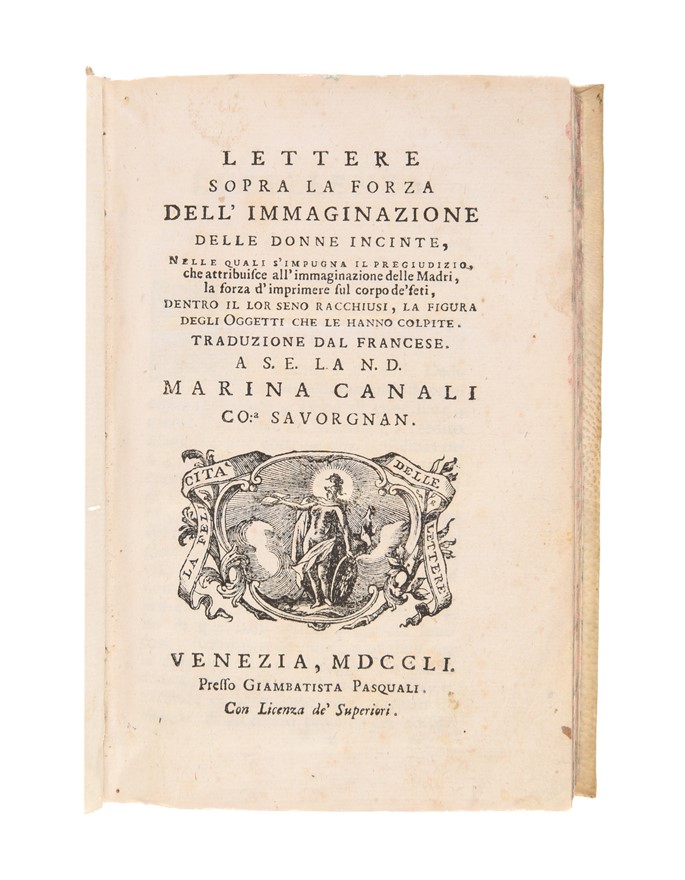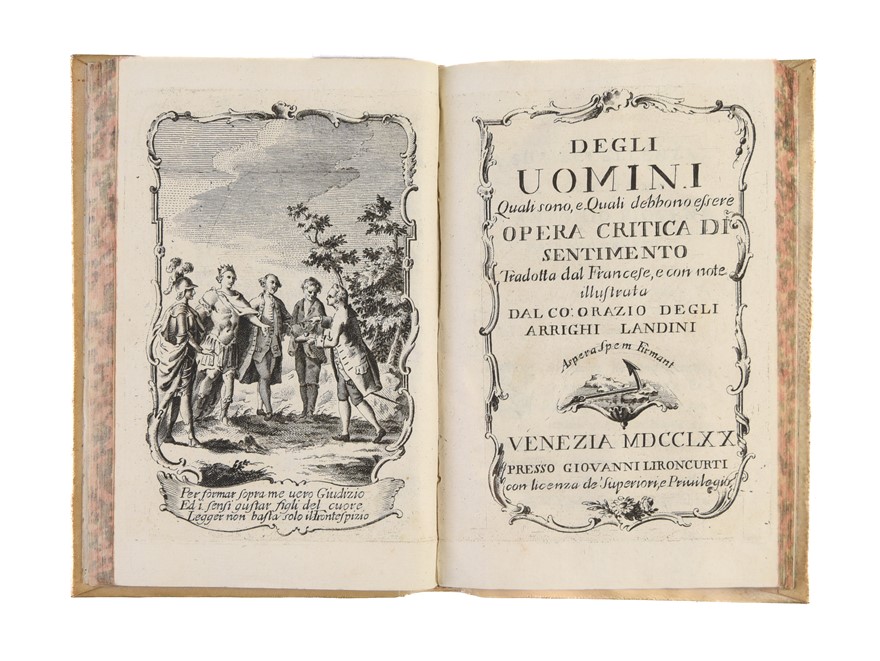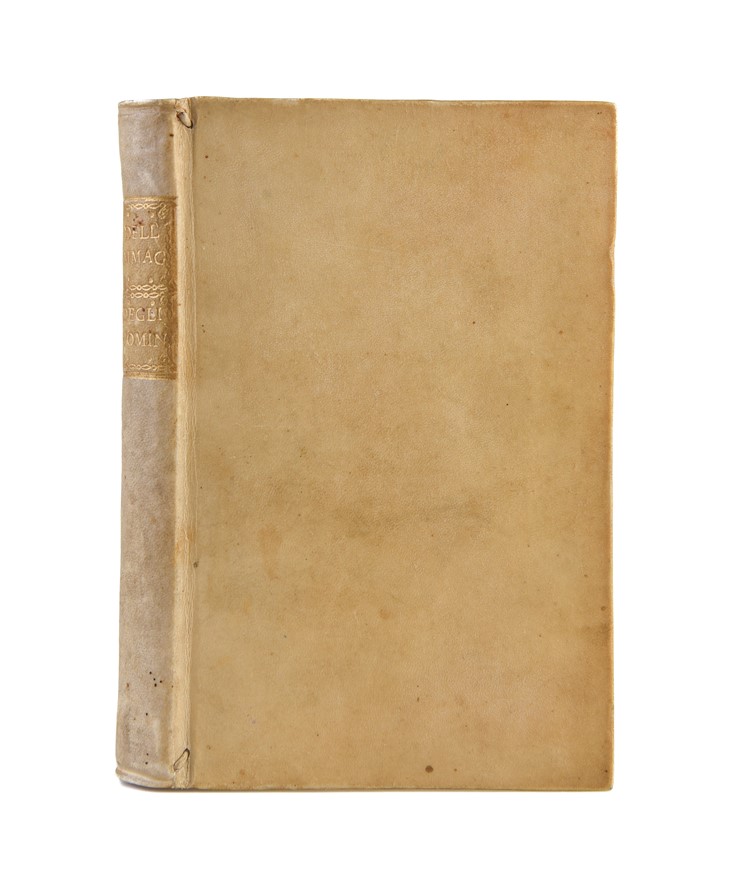Lettere sopra la forza dell'immaginazione delle donne incinte. Venice: Giambattista Pasquali, 1751.
BELLET Isaac; BLONDEL Jean (1751)
£2500.00
Please contact us in advance if you would like to view this book at our Curzon Street shop.
FEMALE PSYCHOLOGY IN PREGNANCY: THE DEBATE OVER MATERNAL IMAGINATION IN A CURIOUS SAMMELBAND
With woodcut device on title page. [12], 108pp.
(with:) Degli Uomini quali sono, e quali debbono essere. Venezia: Giovanni Lironcurti, 1770.
Engraved frontispiece of male figures, with accompanying rhyme encouraging the reader to read beyond the frontispiece, engraved title page, enclosed within rococo border. [4], xvi, 159, [1]pp. 8vo (169 x 108mm). Contemporary vellum, spine with title lettered in gilt, speckled edges.
An intriguing sammelband of two rare and unusual works, unexpectedly bound together here; the first a work of pseudo-psychology, a scientific discussion of female imagination in pregnancy; the second a study of male sentiment and sociability in eighteenth-century society. Both are rare: of the first we have found only two copies in US libraries, and of the second we have found one copy in Italy alone.
The first text in the volume is the first Italian translation of French royal physician Isaac Bellet's Lettres sur le pouvoir de l’imagination des femmes enceintes (1745), translated into Italian by distinguished Italian medic, scientist Giovanni Fortunato Bianchini (1719-1779). Bellet's work of polite medicine contributed to the heated, eighteenth-century debate over the power of a pregnant woman's imagination, desires and emotion to shape the physical development of her unborn child. Concerned, at its heart, with female agency and interiority as things to be policed, so-called Imaginationists "emphasized the power of pregnant women's imaginations -activated by the sight of an object, event or person - to recreate signs of their emotions or passions (often desire, but also fear or abjection) in the bodies of their unborn children" (Meeker, 'Lire et devenir', 50). A notorious example from this period was hoaxer Mary Toft, who claimed that having been startled by a rabbit in a field, she subsequently gave birth to rabbits. Even Voltaire gave credence to the imaginationist thesis, writing 'this passive imagination of easily shaken brains often produces in children the visible marks of an impression that the mother has received' (Doniger, 'Misconceptions', 113).
The present work, however, is firmly anti-Imaginationist, with Bellet - and by extent, his translator Bianchini - rejecting as ridiculous and potentially harmful the notion of transmission between mother and foetus. "Bellet argued against maternal impressions, and he also reported that this mistaken prejudice destroyed the repose and health of pregnant women. The smallest events made them anxious or alarmed, and they lived in fear of experiencing or thinking something that would hurt their infants" (Epstein, 152; see the 'Avviso al Lettore' here). This progressive viewpoint is evident in the format of this work, which is structured as a series of letters addressed directly to women, the only work on this subject that we have found to be so. It is slightly undermined by Bellet's reason for doing so, however, which he explains as needing to adapt to the 'intelligence of women'; 'mi perdonino le Dame, se io le conto fra quei che non sanno tante belle cose della natura' (Avviso).
Bellet's work was widely translated; the first English translation was published fourteen years after this one, in 1765. The translator of the present edition, Bianchini, was himself a scientist, interested in atmospheric electricity.
The second work in this volume is a curious companion to the first; the Italian translation of jurist and court administrator Jean Blondel's Des hommes tels qu'ils sont et doivent être, first published in France in 1758. An edition in Italian with a (possibly fictitious?) Hamburg imprint is dated 1759, with the same, entertaining translator as the present edition, the colourful actor and writer, Orazio degli Arrighi Landini (1718-1775). In their addresses to the reader, both the translator and the writer explain that this is a work of 'sentiment', unusual but necessary in the present enlightened age, where men can so often get lost in difficult questions of philosophy and reason that sentiment and sociability, and their absolute necessity, are overlooked. Divided into chapters, the study considers society; leadership; happiness; how men should be useful to society; celibacy; matrimonial happiness; men's folly in attempting to improve women; politeness; French national customs in comparison with others'; and so on. It is an interesting and unusual companion piece to the first work of polite psychology, though both point strongly towards their reader or previous owner having more than a passing interest in contemporary, social and scientific mores.
Provenance: Bookplate of Ludwig von Ficker (1880-1967), Austrian writer and literary figure, whose periodical Der Brenner was an important forum of German-language cultural criticism in early twentieth-century Austria and Germany, accordingly condemned by the Nazi Censorship Office.
OCLC: Lettere...: National Library of Medicine (MD) and Nebraska only. Degli Uomini...: no copies in US.
Refs: W. Doniger, G. Spinner, ‘Misconceptions: Female Imaginations and Male Fantasies in Parental Imprinting’, Daedalus 127.1, 1998, pp.97-129. J. Epstein, ‘The pregnant imagination, Fetal rights and women’s bodies: a historical inquiry’, Yale Journal of Law and the Humanities, vol VII (1995), pp.139-162. N. Meeker, ‘Lire et devenire: the embodied reader and feminine subjectivity in C18th France’, The Eighteenth Century, 47.1 (2006), 39-57.
Stock Code: 250334






